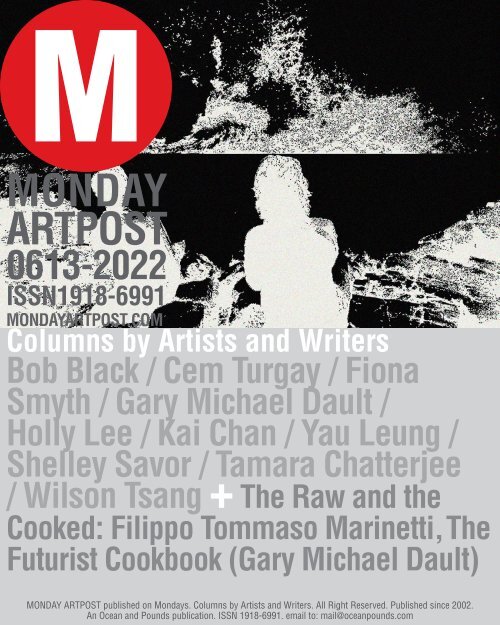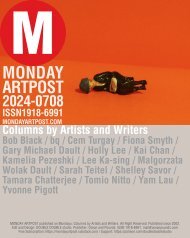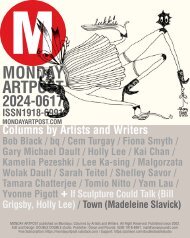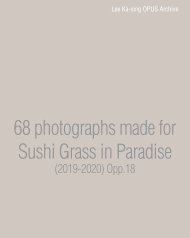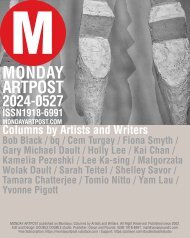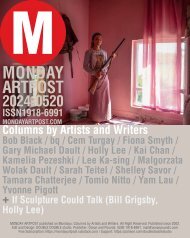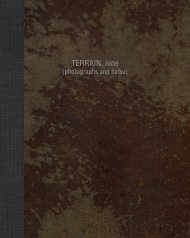You also want an ePaper? Increase the reach of your titles
YUMPU automatically turns print PDFs into web optimized ePapers that Google loves.
<strong>MONDAY</strong><br />
<strong>ARTPOST</strong><br />
<strong>0613</strong>-<strong>2022</strong><br />
ISSN1918-6991<br />
<strong>MONDAY</strong><strong>ARTPOST</strong>.COM<br />
Columns by Artists and Writers<br />
Bob Black / Cem Turgay / Fiona<br />
Smyth / Gary Michael Dault /<br />
Holly Lee / Kai Chan / Yau Leung /<br />
Shelley Savor / Tamara Chatterjee<br />
/ Wilson Tsang + The Raw and the<br />
Cooked: Filippo Tommaso Marinetti, The<br />
Futurist Cookbook (Gary Michael Dault)<br />
<strong>MONDAY</strong> <strong>ARTPOST</strong> published on Mondays. Columns by Artists and Writers. All Right Reserved. Published since 2002.<br />
An Ocean and Pounds publication. ISSN 1918-6991. email to: mail@oceanpounds.com
A number of WAYS to not miss your weekly<br />
<strong>MONDAY</strong> <strong>ARTPOST</strong><br />
Subscribe inbox Notifications about new issue<br />
https://oceanpounds.com/pages/artpost<br />
Browse OCEANPOUNDS front page<br />
https://oceanpounds.com<br />
Visit OCEAN POUNDS Reading Room<br />
https://oceanpounds.com/blogs/rr<br />
“Sadness is but a wall<br />
between two gardens.”<br />
Follow FACEBOOK Page<br />
https://facebook.com/mondayartpost<br />
Follow INSTAGRAM<br />
https://www.instagram.com/oceanpounds<br />
Follow TWITTER<br />
https://twitter.com/ocean_pounds<br />
Kahlil Gibran<br />
Join PATREON membership<br />
https://patreon.com/doubledoublestudio
Poem a Week<br />
Gary Michael Dault<br />
The Lady Holds a Unicorn<br />
(after a Painting by Raphael from 1506)<br />
The lady holds a unicorn<br />
in the crook of her milky arm<br />
the unicorn is tiny<br />
green like an onion<br />
its horn a delicate twist of bone<br />
Nestled thus, corkscrew horn in air<br />
the baby unicorn is warm as bread<br />
and free to remember meadows<br />
blooming with the Fleur-de-lys<br />
While for her part<br />
the lady, mistress of the momentary,<br />
is free to sense the draft of dreams<br />
beneath the keel of her decorous afternoon
Caffeine Reveries<br />
Shelley Savor<br />
Cloud Cover
DOUBLE DOUBLE current issue, 200 pages.<br />
Read-on-line book and Paperback editions available.
ART LOGBOOK<br />
Holly Lee<br />
1. The Last Apostle - a full-length documentary that follows Dr. Fairchild as he explores ancient<br />
Turkey.<br />
https://tubitv.com/movies/568088/the-last-apostle?start=true<br />
(streaming free, 2 hours)<br />
2. Modern Photographs from The Thomas Walther Collection 1909–1949<br />
https://www.moma.org/calendar/exhibitions/1453?installation_image_index=0<br />
Note: use arrow on lower right corner to navigate all the images
CHEEZ<br />
Fiona Smyth
Greenwood<br />
Kai Chan<br />
Drawing, pastel, graphite
ProTesT<br />
Cem Turgay
Travelling Palm<br />
Snapshots<br />
Tamara Chatterjee<br />
Madagascar (March, 2010) – It was a great<br />
morning; elated from my tented view of<br />
a spectacular starry night, I woke up to<br />
the animated sounds of nature. As the day<br />
progressed naturally the animation took on<br />
another scenery all together, it reminded<br />
me of a simpler time. Over a decade later;<br />
through the process of archiving, I am<br />
delighted to be reminded again. It certainly<br />
helps spin the axis forward into the unknown<br />
future.
Yesterday Hong Kong<br />
Yau Leung<br />
Memorial Day Ceremony (Central 1968)<br />
8x10 inch, gelatin silver photograph printed in the nineties<br />
OP Selection, edition 1/100, signed on verso<br />
From the collection of Lee Ka-sing and Holly Lee
TANGENTS<br />
Wilson Tsang<br />
The Cage
From the Notebooks<br />
(2010-<strong>2022</strong>)<br />
Gary Michael Dault<br />
Number 141: Loon (May 25, <strong>2022</strong>)
Leaving Taichung<br />
Station<br />
Bob Black<br />
Trois couleurs: 最 好 的 時 光<br />
“Does the world have nothing inside but sorrow?”–Andrei Platonov<br />
“On windy or rainy days, naturally there are times when these clocks would stop…”-- 陳 黎<br />
I<br />
1986: Hooker’s Green (a time for youth)<br />
Chaiyi – Taichung- Kenting<br />
And the years slip like breath along the edges of our skin, an abundance and a reckoning, the
we tasted the brine back up inside us and upon our tongues<br />
otter and kelp and elm and evicted spit, clams<br />
and we collapsed.<br />
firmament spreads wide, like a gap-toothed space, dark and unending. Pitch and Pale above, all that<br />
which twined and coursed through you, comes forth like small accumulations. And then<br />
I was here, fallen into a world that had not prepared for my waking—green was my Island home,<br />
green was the sound of my mother’s tears as I was born, green was the scent of the papaya my father<br />
fed her to assuage her fear, green was the sound of neighbors screaming in downtown Taichung,<br />
green was my vibrant heart, the rice fields and the stone rivers and the thumb in my mouth and<br />
the vegetables been hawked every morning, green the vegetable sellers voice with the sails of the<br />
morning, green of my mother’s grumpy breath and most importantly green of my grandmother’s<br />
eyes to me: emerald as the mountain cats and soaring hawks, she a keeper of the land and the<br />
maker of my heart.<br />
Blindness, from the beginning, it snaked its way into my eyes and wording, and I could not tell the<br />
difference between day and night, between body and absence, between the sky and the ground,<br />
between winter and spring, between melon and dragon fruit, that swimming. There was only way to<br />
distinguish things when you are blind:<br />
Name it green and tossed up from the surf<br />
The shells slipped over our shoulders and down our neck and the blood rivered on until the jetty of<br />
sand and stone unreeled,<br />
And in the Cawl, the sea birds balked and the children reaned up and we<br />
Seeds every moment<br />
Took beach root.<br />
In our drowning we saw bioluminescence and the light ran green as did our swollen tongues.<br />
Once we’d lost the sea for salt, the Zhuoshui singled everything out<br />
Singled and sang instead, name after name<br />
And waves unbuckled and the ghosts spoke less forlorn<br />
And into the inlet we went battering.<br />
And the land grow quick and long underneath the briny touch<br />
Rusted tackle and bait, wave wracked you:<br />
Holding onto a wet sky and there we were, shine and bone and dream and aquagreen.<br />
The movement and difference of temperature: our bodies laundered by the sea<br />
and<br />
the sea tugs at the stories splinter by splinter, tag upon bonerage ocean tag<br />
seagulls pick at the ribs of a beached leviathan<br />
alabaster space and stillness,<br />
ligature and leftover and barnacled keel,<br />
until life swells back into the sandy earth and runs away waving<br />
and all is drawn back,<br />
crescent and swelling<br />
all the drowning taken under, lung by lung and we were<br />
swell and as the coiled cold pierced our lungs
Support and Become our Patreon member<br />
https://www.patreon.com/doubledoublestudio<br />
Unlimited access to all<br />
read-on-line books, patrons<br />
only contents. Collecting<br />
artworks at discounts.<br />
Patreon Membership: Friend of Double Double ($5), Benefactor Member ($10), Print Collector ($100) Monthly subscription in US currency
The Raw and<br />
the Cooked,<br />
MYTHOLOGIQUES<br />
(On the culture of<br />
eating and cooking,<br />
contributions from<br />
various authors)
Marinetti, Futurist Cookbook, 1989.<br />
The Raw and the Cooked:<br />
Filippo Tommaso<br />
Marinetti, The Futurist<br />
Cookbook<br />
(London: Trefoil Publications, 1989).<br />
Gary Michael Dault<br />
There is a famous photograph, taken in 1912 in Paris, of five of the most prominent and<br />
indeed infamous of the Italian Futurists who, at the time of the photo, were about to exhibit their art<br />
in the heartland of Cubism and, in their view, bring a shot of neopolitan brio to what they considered<br />
the increasingly moribund Cubist scene. They are all dressed in voluminous greatcoats and homburg<br />
hats, and although they are clearly keeping still for the photograph, they nevertheless give the<br />
impression that they are struggling to contain the barely suppressible convulsive vitality that was so<br />
central to their beliefs, their behaviour and their desires.<br />
The big fiercely-hearty guy in the middle is Filippo Tommaso Marinetti (1876-1944), the<br />
founder of the Italian Futurist movement and a wealthy poet, editor, playwright and general literary<br />
impresario. To his right are painters Luigi Russolo and Carlo Carra. To his left are painter-sculptor<br />
Umberto Boccioni and painter Gino Severini.
The Futurists in Paris, 1912
For Marinetti (once dubbed “the caffein of Europe”) and the other<br />
Italian Futurists, contemporary culture--and the modernist art that<br />
reflected it--had run out of creative steam. It was the Futurist mission, a<br />
mission passionately held, that a new art must be built on kinetic force,<br />
motion, even aggression and, if need be, violence.<br />
The Futurist task, Marinetti felt, was to stage a culture-wide “carnival<br />
of provocation.” It was part of that unruly, disruptive “carnival” that<br />
led Marinetti to declare, for example, that a speeding automobile was<br />
more beautiful than the Winged Victory of Samothrace. Marinetti<br />
was apparently quite serious in suggesting (in a Futurist manifesto of<br />
1909) that war was “the world’s only hygiene,” and that he intended to<br />
glorify it. He also vowed to destroy all museums (and thereby destroy<br />
the cultural past). Arch-romantic that he was, one of Marinetti’s bestknown<br />
manifesto-proclamations was titled “Let’s Murder the Moonshine”<br />
(or, in the translation I have, “Let’s Kill Off The Moonlight.”).<br />
Marinetti was surprisingly successful in his revolutionary fever<br />
dreams, partly because he was such an electrifying writer. He would<br />
destroy on every hand (rhetorically at least) “bridges that stride the<br />
rivers like giant gymnasts, flashing in the sun with a glitter of knives;<br />
adventurous steamers that sniff the horizon, deep-chested locomotives<br />
whose wheels paw the tracks like the hooves of enormous steel horses<br />
bridled by tubing....” And on and on, rapturously, volcanically.<br />
It was inevitable that this rupturing volatility of the Futurists would<br />
catch the ear of the coming buffoon, Mussolini, and it wouldn’t be long<br />
before the proto-fascist Marinetti and the others would be awarded full<br />
fascist stature.<br />
Which they didn’t do much with. Except for the writer Marinetti, the<br />
Italian Futurists were mostly painters and sculptors, not politicians.<br />
In essence they were more farcists and fantacists than fascists.<br />
Futurist triangular plate<br />
Marinetti-designed dinner plate<br />
As unlikely as it sounds, Marinetti also had a surprisingly warm and<br />
playful side. He was apparently a kind and generous man and also a<br />
devoted husband and a doting father. And it’s pretty clear that a lot of<br />
his blustering, realpolitik mischief was just that: mischief--of a wildly<br />
self-promotional kind.<br />
Take his infamous Futurist Cookbook, published in 1932.<br />
As the editor of the 1989 reprint, Lesley Chamberlain, points out,<br />
“Futurist ‘cooking’ was revolutionary and a joke because actually it was
Marinetti with two of his daughters, Vittoria and Ala (1932)<br />
about food as raw material for art. It was not a collection of recipes for<br />
self-nourishment but a disguised artistic game full of ideas for avantgarde<br />
experiments. Spinach, tomato, egg whites and prunes: you name<br />
the ingredient. Marinetti looked upon them all as colours and building<br />
blocks and put them together with colour and shape and ideas in mind,<br />
not taste.”<br />
The Futurists came out strongly against traditions and indeed all<br />
accepted ideas about food. Marinetti was particularly upset (if one can<br />
believe his writings on the subject) about pasta, citing Schopenhauer (no<br />
less) that in their daily eating habits, Italians--with their dependence<br />
on pasta dishes--were feeding upon “the food of the resigned” (did<br />
Schopenhauer really say this?). It was the Futurist mission, culinarily<br />
speaking, to rescue Italians from the torpor of their physiological lives<br />
“with the inevitable harmful reverberations in the psychical sphere.”<br />
The healing, transformative dishes the Futurists suggested included<br />
“Sunshine Soup” and their famous “Sculpted Meat” dishes (“symbolic<br />
interpretations of all the varied landscapes of Italy, composed of large<br />
cylindrical rissoles of minced roast veal, stuffed with eleven different<br />
kinds of cooked green vegetables and then re-roasted”. This cylinder,<br />
the cookbook observes, “standing upright in the centre of the plate,<br />
is crowned by a layer of honey and supported at the base by a ring of<br />
sausages resting on three golden spheres of chicken meat.” “A marvel<br />
of balance,” writes Marinetti enthusiastically.<br />
Other Futurist kitchen delights included “Drum Roll of Colonial<br />
Fish” (roasted mullet stuffed with date jam and pineapple and eaten to<br />
“a continuous rolling of drums”), “Raw Meat Torn by Trumpet Blasts,”<br />
a seven-course “Tourist Dinner,” featuring “Peaches stoned and filled<br />
with sweet Tuscan wine and closed up again, floating an a sea of cognac”<br />
(yum!), and--my favourite Futurist dish--”The Excited Pig.”<br />
Here is the complete recipe for The Excited Pig”:<br />
“A whole salami. skinned, is served upright on a dish containing<br />
some very hot black coffee mixed with a good deal of eau de Cologne.”<br />
Buon appetito!
https://www.blurb.ca/b/11161209-cheez-456<br />
Order online, cad$85 each.
Under the management of Ocean and Pounds<br />
Since 2008, INDEXG B&B have served curators, artists,<br />
art-admirers, collectors and professionals from different<br />
cities visiting and working in Toronto.<br />
INDEXG B&B<br />
48 Gladstone Avenue, Toronto<br />
Booking:<br />
mail@indexgbb.com<br />
416.535.6957


